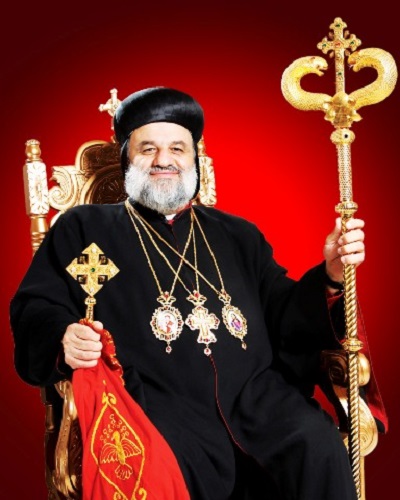
Patriarch Of Antioch & All The East Moran Mor Ignatius Aphrem II
Since St. Peter has assumed the leadership of the Church and had make use of Antioch as the capital to lead the Church, those who are ordained as Patriarchs by the church to succeed St.Peter are no doubt the successors and emissaries of St.Peter. The divine grace is handed down from Jesus to St.Peter, St.Peter to his successors the Metropolitans to Priests, and from Priests to the laity. Thus in the Syrian Orthodox Church the Patriarch represents the first and the foremost link in respect of the apostolic succession and divine priesthood.
The universal Syrian Orthodox Church perceives its strength and Unity in His Holiness the Patriarch, the supreme head of the Church. As the Sucessor of the St.Peter, His Holiness is the embodiment and symbol of unity of the universal Syrian Orthodox Church. This embodiment signifies two type of representative characters. Firstly, as the successor of St.Peter, the patriarch represent him. As St.Peter is the chief shepherd and supreme head, the Patriarch by virtue of his position upholds the unity of the Universal Syrian Orthodox Church. Since the Patrirach’s ordination and conornation are deemed to be through the grace of the Holy Ghost and by the will of God, the first representative character is bestowed from above and is divine. So the Patriarch as the high priest the Universal Church, represents Jesus Christ when he celebrates the Holy Eucharist. Secondly the Patriarch as the chief Shepherd of the Church, is the emissary of the entire body of believers. The church is not only an invisible spiritual fellowship but is also a historical reality. So, all the attributes of the Church like one, Holy, Chatholic and Apostolic must also become a historical reality. And the Patriarchs who are ordained from time to time and represent the universal Syrian Church as the Supreme heads, make the unity of the Church a reality.
The spiritual care of the Church of Antioch was vested in the Bishop of Antioch from the earliest years of Christianity. The first among the Bishops of Antioch was St. Peter who is believed to have established a church at Antioch in AD 37. Given the antiquity of the bishopric of Antioch and the importance of the Church in the city of Antioch which was a commercially significant city in the eastern parts of the Roman Empire, the Synod of Nicaea (AD 325) recognized the bishopric as a Patriarchate along with the bishoprics of Rome, Alexandria, and Jerusalem, bestowing authority for the Church in Antioch and All of the East on the Patriarch. (The Synod of Constantinople in AD 381 recognized the See of Constantinople also as a Patriarchate). Even though the Synod of Nicaea was convened by the Roman Emperor Constantine, the authority of the ecumenical synod was also accepted by the Church in the Persian Empire which was politically isolated from the Churches in the Roman Empire. Until AD 498, this Church accepted the spiritual authority of the Patriarch of Antioch.
The Christological controversies that followed the Council of Chalcedon in AD 451resulted in a long struggle for the Patriarchate between those who accepted and those who rejected the Council. In AD 518, Patriarch Mor Severius was exiled from the city of Antioch and took refuge in Alexandria. On account of many historical upheavals and consequent hardships which the church had to undergo, the Patriarchate was transferred to different monasteries in Mesopotamia for centuries. In the 13th century it was transferred in the Monastery of Mor Hananyo (Deir al-Za`faran), near Mardin, Turkey, where it remained until 1933. Due to adverse political situation, it was transferred to Homs, Syria and in 1959 was transferred again to Damascus, Syria.
The Patriarchate office is situated in Bab Touma, in the city of Damascus, capital of Syria. The Patriarch resides at the Mor Ephrem Monastery in Ma`arat Sayyidnaya, near Damascus.
Official Address:
Syrian Orthodox Patriarchate
Bab Touma, P.O. Box 22260
Damascus, Syria
Tel: (+963)-11-543-5918, 542-0122
Fax: (+963)-11-543-2400
Telex: OUSSI 411876 SY.
